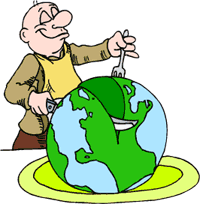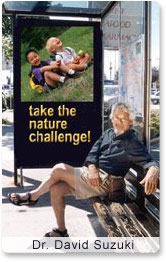|
David Suzuki, a Canadian scientist, environmentalist and broadcaster, has a simple message for us all:
Whatever we do to nature, we do to ourselves.
Huh? Is this just some sort of wacko, eco-freak message? It may seem that way on its surface, but if we analyze it, we find that it is true—-literally. Here goes...
 Dr. Suzuki often hearkens back to the ancient wisdom that there are four basic elements—earth, air, fire, and water—and that we humans (and other life forms) are composed of them. That sounds silly, but check out his reasoning:
Dr. Suzuki often hearkens back to the ancient wisdom that there are four basic elements—earth, air, fire, and water—and that we humans (and other life forms) are composed of them. That sounds silly, but check out his reasoning:
- EARTH: The food we eat—i.e. the food that we will digest and convert into muscle, bone, blood, and other body parts— is grown in and draws nutrients from soil (earth).
- WATER: Water is essential to our existence, both directly (to hydrate our cells) and indirectly (as part of our food). And whether you get your water from a tap or a plastic bottle, its ultimate source is nature.
- AIR: As we breathe air, our bodies use oxygen from the air to create energy, build cells, and maintain healthy body functions.
- FIRE: Energy from sunlight—a sort of fire—is collected by plants as they grow and gives rise to plant-based foods and farm animals that we, in turn, eat and make part of our bodies.
So, we can see that in a very literal sense, we are indeed composed of earth, air, fire and water. Or, put another way, we are totally dependent on these components of nature—they are part of us.
Our lungs and intestinal tract serve as our "interface" with the natural world:
- As we breathe, our lungs fill not only with air, but also with whatever else is in the air (i.e. pollution). Many air pollutants—for instance, smog—react directly and immediately with the tissues in our lungs. Other air pollutants, such as particulate matter (soot), can become embedded in our lungs and cause problems over a longer timeframe.
- When we eat food and drink water, our intestinal tracts break down the food into molecule-sized particles so it can use them for the appropriate body functions. The digestive system must also process, if it can, any toxins that came in as "stowaways" in the water and food. As with air, some water pollutants can harm us in a short time, though the more normal case is that pollutants from water and food accumulate in us over long periods of time and cause health problems that come on slowly.
This intimate interface between our body and the planet's water, earth, and air is the basis for Dr. Suzuki's assertion that whatever we do to nature, we do to ourselves.
All of the molecules on the planet—including those in us, in our water, in our food, in our air—circulate over time. Bad molecules circulate right along with good molecules; there's no trash dump where they go and stay forever. Sooner or later, the toxins we have put into nature find their way back to us.
Planet earth and its natural components do have the inherent ability to cleanse earth, air, and water of pollution. For instance, trees have been planted on toxic waste sites to uptake and sequester chemicals from contaminated soil. Forest ecosystems can purify water, and trees can remove pollution from the air.
Similarly, our bodies have an inherent ability to process and get rid of toxins. But the increasing body burden of chemicals that each of us now carries should be seen as a clear warning that the level of pollution in the air, food, and water we "interface with" is higher than either our planetary or bodily cleansing systems can keep up with.
|
Environmentalists are often labeled "tree-huggers" and "bunny-lovers," the gist being that they care more about trees and furry critters than human beings. There may be a few of those, but the overwhelming majority of environmentalists care about ALL life on the planet, including humans, and are only trying to ensure that we are all healthy and prosperous.
Grinning Planet salutes David Suzuki and his efforts to keep Mother Earth—and us—healthy.
|

|
Know someone who might like this article?
Send it to them
Resources:
Related articles:
DETOX—NOT JUST FOR HOLLYWOOD NIMRODS
Parallel Detoxification Systems for Planet Earth and the Human Body
GOOD ADVICE: DON’T BUG THE WEB OF LIFE
10 Threats to the Web of Life on Planet Earth
More articles and resources on....
Get Grinning Planet free via email
|


